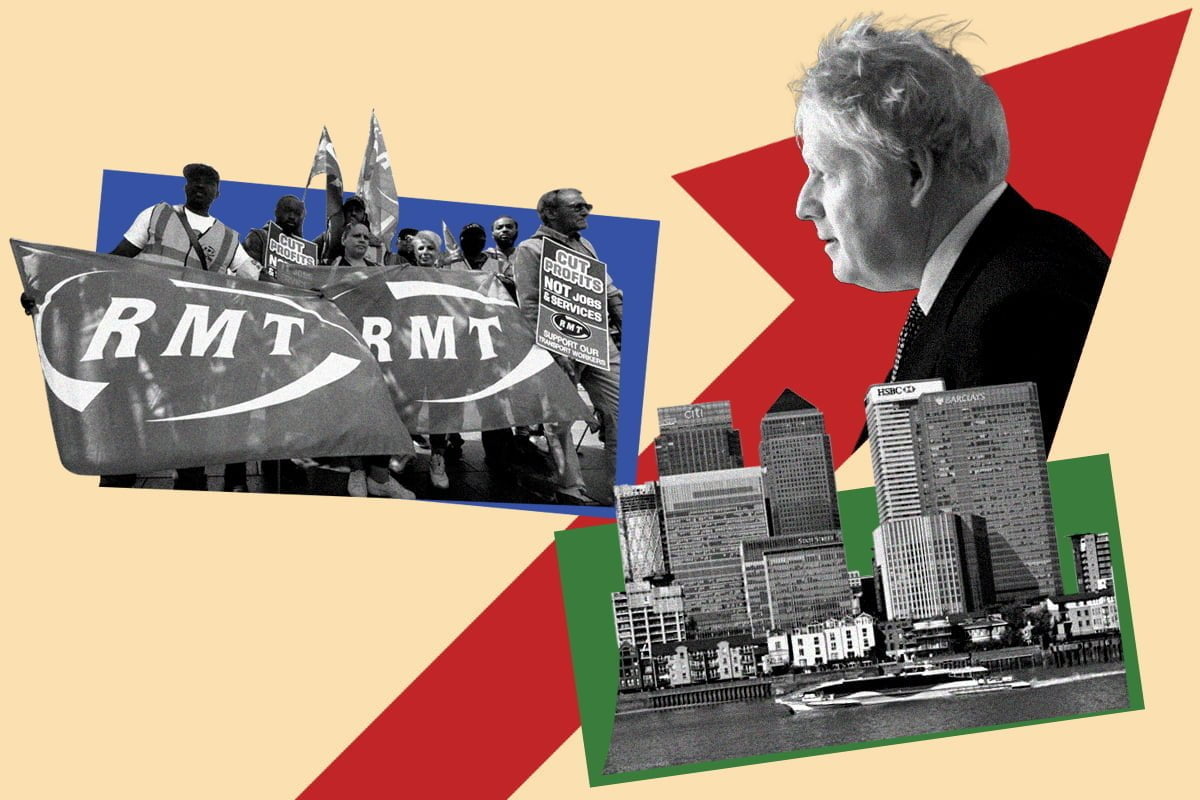Less than twelve months ago, in his keynote speech to the Conservative Party conference last September, Boris Johnson was pledging to create a ‘high wage’ economy.
Now, however, as inflation continues to rise, and the unions begin to move, ‘wage restraint’ has become the Tory leader’s latest mantra.
Bank of England governor Andrew Bailey has also provoked outrage by calling on workers to show ‘restraint’ in regards to demands for higher pay. Of course, Bailey has shown little restraint himself, taking home a healthy £575,000 salary last year.
These big business representatives arrogantly assert that wage increases will fuel inflation. But none of them mention what the real causes of rising prices are.
Instead, we are simply told that workers are to blame – and that workers, therefore, must be the ones to bear these ever-increasing costs.
Shocks and shortages

A number of factors have combined to generate the current four-decade high in inflation.
Firstly, a deluge of credit and cheap money has flooded the system, thanks to the ruling class’ efforts to prop up capitalism through the coronavirus crisis.
This has combined with a series of supply shocks, with the war in Ukraine battering a global economy already reeling from the chaos of COVID. This has led to severe shortages of many vital commodities, such as gas, oil, wheat, and fertilisers.
Transport and fuel, in turn, have become significantly more expensive. And this has fed into rising prices across other sectors of the economy. A turn towards protectionism, meanwhile, has added to production and distribution costs.
Pay and profiteering
With most markets dominated by a handful of monopolies, profiteering corporations have attempted to offload increased costs onto consumers.
This is the conclusion of a recent report published by Unite the Union. Rather than seeing a ‘wage-price spiral’, as Johnson, Bailey, and other capitalist commentators warn us about, Unite’s research finds that the UK economy is suffering from a profit-price spiral.
The report reveals, for example, that the bosses’ super-profits are responsible for almost 60% of inflation in the last six months. While actual sales were down last year, profits continued to rise. Profit margins for the UK’s biggest listed companies were 73% higher in 2021 than pre-pandemic levels.
At the same time, whilst essential workers have seen their wages stagnate or fall in real terms, average annual executive pay has increased to £2.59 million. And whilst workers have been faced with layoffs or brutal ‘fire and rehire’ tactics, big business bosses have opportunistically engaged in vicious price gouging, stoking the fires of inflation.
And yet where are the calls from the apologists of capitalism for these corporate fat cats to show restraint when it comes to their pay and profits?
Value, price, and profit

Listening to the representatives of capital, you’d be led to believe that workers should be grateful that benevolent bosses provide them with jobs and wages.
Every strike – including the recent inspiring action by rail workers – demonstrates quite the opposite, however: without workers’ labour, the bosses’ profits evaporate.
As RMT general secretary Mick Lynch has correctly asserted, it is workers who are responsible for creating all the wealth in society.
“You have the power. A wheel doesn’t turn. A light doesn’t go on without us.”
Speaking at the @RMTunion rally at King’s Cross, Mick Lynch calls on workers of the UK to unite and demand better conditions for all pic.twitter.com/pS2kqm7Q0B
— PoliticsJOE (@PoliticsJOE_UK) June 25, 2022
Marx explained this in his economic writings, such as his pamphlet on Value, Price, and Profit.
Within a working day, Marx outlined, workers labour to produce commodities: goods and services sold on the market. For a certain portion of this time, workers produce the value of their ‘labour power’, paid in the form of wages. For the rest of this working time, they create surplus value, from which all the profits of the capitalists are derived.
This drive for greater profits is what motivates the capitalists: to cut costs by attacking wages and conditions; or to invest in technology, in order to raise productivity and reduce the number of workers employed.
In the final analysis, Marx shows, there exists a zero-sum game between the capitalists and workers. The workers create all new value in the economy through their labour. And this is then divided between capitalists and workers in the form of profits and wages. What one class gains, the other class loses.
That is why the bosses fight so viciously to keep wages down – and why they are now shouting at workers to show ‘wage restraint’.
Abolish the bosses’ system!
This latest report from Unite confirms what Marx explained over 150 years ago: workers are not to blame for inflation, but are the victims of it.
The real culprit is capitalism: an anarchic system – based on competition and production for profit – that is unable to guarantee a decent life and livelihood to the vast majority of humanity.
We have the resources and money in society to provide food, shelter, healthcare, and education for all. But it sits in the hands of capitalist parasites.
It is about time we expropriated this wealth, taking ownership of the banks and monopolies out of private hands, and placing them under workers’ control, as part of a socialist economic plan.
This would put an end to the profiteering of the capitalists, and enable necessities like energy and housing to be provided for all.
This is why Marx called on the trade unions “to inscribe on their banner the revolutionary watchword: ‘Abolition of the wages system!’” – that is, not to simply tackle the symptoms of the problem by demanding higher wages, but to fight for a socialist planned economy that can eliminate all want, scarcity, and poverty once and for all.






